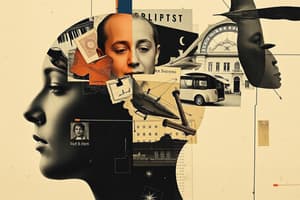Podcast
Questions and Answers
What is the primary function of perception in our daily lives?
What is the primary function of perception in our daily lives?
- To distinguish between real and imagined experiences
- To interpret and make sense of sensory information (correct)
- To create mental images or scenarios
- To evaluate the reality of mental images
According to research, how does the brain distinguish between real and imagined experiences?
According to research, how does the brain distinguish between real and imagined experiences?
- By evaluating the strength of the signal against a 'reality threshold' (correct)
- By analyzing the context of the experience
- By comparing the signal to past experiences
- By using a separate system for reality and imagination
What happens when an imagined signal is strong enough to cross the 'reality threshold'?
What happens when an imagined signal is strong enough to cross the 'reality threshold'?
- The brain evaluates the signal further
- The brain processes the signal as real (correct)
- The brain ignores the signal
- The brain rejects the signal as imagined
What is the result of the interplay between reality and fantasy?
What is the result of the interplay between reality and fantasy?
What is the purpose of the brain's 'reality threshold' system?
What is the purpose of the brain's 'reality threshold' system?
What is the relationship between perception and imagination?
What is the relationship between perception and imagination?
What concept does the reality-impossibility model help in understanding?
What concept does the reality-impossibility model help in understanding?
How does imagination impact our understanding of the world?
How does imagination impact our understanding of the world?
Which technology is mentioned in the text as blurring the lines between reality and fantasy?
Which technology is mentioned in the text as blurring the lines between reality and fantasy?
What is an example of a way in which imagination can be expressed?
What is an example of a way in which imagination can be expressed?
How does the reality-impossibility model help in the exploration of experiences?
How does the reality-impossibility model help in the exploration of experiences?
What is the significance of distinguishing between reality and fantasy according to the text?
What is the significance of distinguishing between reality and fantasy according to the text?
Flashcards are hidden until you start studying
Study Notes
Reality vs. Fantasy: The Interplay of Perception and Imagination
In our daily lives, we experience a multitude of perceptions and imagination. While these two elements are often intertwined, they are distinct in their nature and function. Perception refers to the process by which we interpret and make sense of the information we receive from our senses, while imagination involves the creation of mental images or scenarios that are not based on real-world experiences.
The Brain's Perception and Imagination System
Research has shown that the human brain is capable of distinguishing between real and imagined experiences. According to recent studies, the brain evaluates the images it is processing against a "reality threshold." If the signal passes the threshold, the brain thinks it's real; if it doesn't, the brain thinks it's imagined. However, if an imagined signal is strong enough to cross the threshold, the brain takes it for reality. This system is crucial for maintaining our sense of reality and is responsible for our ability to tell the difference between the world around us and the images in our minds.
The Reality-Fantasy Continuum
The distinction between reality and fantasy is not always clear-cut, as both elements can intermingle and influence each other. One framework that helps understand the relationship between reality and fantasy is the reality-impossibility model, which posits that experiences can be classified based on their adherence to the laws of physics and their reality-fantasy character. This model allows for a more nuanced exploration of the role of imagination in shaping our perceptions and experiences.
The Influence of Imagination on Perception
Imagination plays a significant role in our perception of reality. It allows us to create mental scenarios and explore alternative realities, which can influence our understanding of the world around us. For example, reading a novel or watching a movie can transport us into a different world, blurring the lines between reality and fantasy. This blurring can be both entertaining and educational, as it allows us to experience different perspectives and ideas.
The Role of Imagination in Extended Reality
Immersive technologies, such as virtual reality (VR) and augmented reality (AR), are becoming increasingly popular for creating experiences that straddle the reality-fantasy divide. These technologies enable us to interact with virtual environments that may not follow the laws of physics, providing new opportunities for exploration and learning. As these technologies continue to evolve, they are likely to further blur the lines between reality and fantasy, challenging our perceptions and understanding of both.
In conclusion, reality and fantasy are two distinct but interconnected elements that shape our perceptions and experiences. The brain's ability to distinguish between these two elements is crucial for maintaining our sense of reality, while imagination provides a means for exploration and understanding of alternative realities. As our technologies continue to advance, the boundary between reality and fantasy is likely to become increasingly blurred, offering new opportunities for both entertainment and enlightenment.
Studying That Suits You
Use AI to generate personalized quizzes and flashcards to suit your learning preferences.




